- Home
- H. Rider Haggard
Dawn Page 7
Dawn Read online
Page 7
CHAPTER VII
Nothing occurred to interfere with the plan of action decided on byHilda and Philip; no misadventure came to mock them, dashing theTantalus cup of joy to earth before their eyes. On the contrary,within forty-eight hours of the conversation recorded in the lastchapter, they were as completely and irrevocably man and wife, as aspecial licence and the curate of a city church, assisted by the clerkand the pew-opener, could make them.
Then followed a brief period of such delirium as turned the Londonlodgings, dingy and stuffy as they were in the height of the hotsummer, into an earthly paradise, a garden of Eden, into which, alas!the serpent had no need to seek an entrance. But, as was natural, whenthe first glory of realized happiness was beginning to grow faint ontheir horizon, the young couple turned themselves to consider theirposition, and found in it, mutually and severally, many things thatdid not please them. For Philip, indeed, it was full of anxieties, forhe had many complications to deal with. First there was his secretengagement to Maria Lee, of which, be it remembered, his wife wastotally ignorant, and which was in itself a sufficiently awkwardaffair for a married man to have on his hands. Then there was theparamount need of keeping his marriage with Hilda as secret as thedead, to say nothing of the necessity of his living, for the mostpart, away from his wife. Indeed, his only consolation was that he hadplenty of money on which to support her, inasmuch as his father had,from the date of his leaving Oxford, made him an allowance of onethousand a year.
Hilda had begun to discover that she was not without her troubles. Forone thing, her husband's fits of moodiness and fretful anxietytroubled her, and led her, possessed as she was with a more thanordinary share of womanly shrewdness, to suspect that he was hidingsomething from her. But what chiefly vexed her proud nature was thenecessity of concealment, and all its attendant petty falsehoods andsubterfuges. It was not pleasant for Hilda Caresfoot to have to passas Mrs. Roberts, and to be careful not to show herself in publicplaces in the daytime, where there was a possibility of her being seenby any one who might recognize in her striking figure the lady who hadlived with Miss Lee in Marlshire. It was not pleasant to her to beobliged to reply to Maria Lee's affectionate letters, full as theywere of entreaty for her return, by epistles that had to be forwardedto a country town in a remote district of Germany to be posted, andwhich were in themselves full of lies that, however white they mighthave seemed under all the circumstances, she felt in her conscience tobe very black indeed. In short, there was in their union none of thatsense of finality and of security that is, under ordinarycircumstances, the distinguishing mark of marriage in this country; itpartook rather of the nature of an illicit connection.
At the end of a fortnight of wedded bliss all these little things hadbegun to make themselves felt, and in truth they were but thecommencement of evils. For, one afternoon, Philip, for the first timesince his wedding, tore himself away from his wife's side, and paid avisit to a club to which he had been recently elected. Here he foundno less than three letters from his father, the first requesting hisreturn, the second commanding it in exceptionally polite language, andthe third--which, written in mingled anxiety and anger, had justarrived--coolly announcing his parent's intention, should he not hearof him by return, of setting detective officers to work to discoverhis whereabouts. From this letter it appeared, indeed, that his cousinGeorge had already been despatched to London to look for him, and onreference to the hall porter he discovered that a gentleman answeringto his description had already inquired for him several times.
Cursing his own folly in not having kept up some communication withhis father, he made the best of his way back to his lodgings, to findHilda waiting for him somewhat disconsolately.
"I am glad you have come back, love," she said, drawing him towardsher till his dark curls mingled with her own fair locks, and kissinghim upon the forehead. "I have missed you dreadfully. I don'tunderstand how I can have lived all these years without you."
"I am afraid, dear, you will have to live without me for a while now;listen," and he read her the letters he had just received.
She listened attentively till he had finished.
"What are you going to do?" she asked, with some anxiety in her voice.
"Do? why of course I must go home at once."
"And what am I to do?"
"Well, I don't know; I suppose that you must stop here."
"That will be pleasant for me, will it not?"
"No, dear, it will be pleasant neither for you nor me; but what can Ido? You know the man my father is to deal with; if I stop here indefiance to his wishes, especially as he has been anxious about me,there is no knowing what might not happen. Remember, Hilda, that wehave to deal with George, whose whole life is devoted to secretendeavours to supplant me. If I were to give him such an opportunityas I should by stopping away now, I should deserve all I got, orrather all I did not get."
Hilda sighed and acquiesced; had she been a softer-minded woman shewould have wept and relieved her feelings, but she was not soft-minded. And so, before the post went out, he wrote an affectionateletter to his father, expressing his sorrow at the latter's anxiety atat his own negligence in not having written to him, the fact of thematter being, he said, that he had been taken up with visiting some ofhis Oxford friends, and had not till that afternoon been near his clubto look for letters. He would, however, he added, return on themorrow, and make his apologies in person.
This letter he handed to his wife to read.
"Do you think that will do?" he asked, when she had finished.
"Oh, yes!" she replied, with a touch of her old sarcasm, "it is amasterpiece of falsehood."
Philip looked very angry, and fumed and fretted; but he made no reply,and on the following morning he departed to Bratham Abbey.
"Ah, Philip, Philip!" said his father, under the mellow influence ofhis fourth glass of port, on the night of his arrival. "I know wellenough what kept you up in town. Well, well, I don't complain, youngmen will be young men; but don't let these affairs interfere with thebusiness of life. Remember Maria Lee, my boy; you have seriousinterests in that direction, interests that must not be trifled with,interests that I have a right to expect you will _not_ trifle with."
His son made no reply, but sipped his wine in silence, aching at hisheart for his absent bride, and wondering what his father would saydid he really know what had "kept him in town."
After this, matters went on smoothly enough for a month or more;since, fortunately for Philip, the great Maria Lee question, aquestion that the more he considered it the more thorny did it appear,was for the moment shelved by the absence of that young lady on avisit to her aunt in the Isle of Wight. Twice during that month hemanaged, on different pretexts, to get up to London and visit hiswife, whom he found as patient as was possible under thecircumstances, but anything but happy. Indeed, on the second occasion,she urged on him strongly the ignominy of her position, and evenbegged him to make a clean breast of it to his father, offering toundertake the task herself. He refused equally warmly, and some sharpwords ensued to be, however, quickly followed by a reconciliation.
On his return from this second visit, Philip found a note signed"affectionately yours, Maria Lee," waiting for him, which announcedthat young lady's return, and begged him to come over to lunch on thefollowing day.
He went--indeed, he had no alternative but to go; and again fortunefavoured him in the person of a diffident young lady who was stoppingwith Maria, and who never left her side all that afternoon, much tothe disgust of the latter and the relief of Philip. One thing,however, he was not spared, and that was the perusal of Hilda's lastletter to her friend, written apparently from Germany, and giving alively description of the writer's daily life and the state of heruncle's health, which, she said, precluded all possibility of herreturn. Alas! he already knew its every line too well; for, as Hildarefused to undertake the task, he had but a week before drafted ithimself. But Philip was growing hardened to deception, a
nd found itpossible to read it from end to end, and speculate upon its contentswith Maria without blush or hesitation.
But he could not always expect to find Miss Lee in the custody of suchan obtuse friend; and, needless to say, it became a matter of veryserious importance to him to know how he should treat her. It occurredto him that his safest course might be to throw himself upon hergenerosity and make a clean breast of it; but when it came to thepoint he was too weak to thus expose his shameful conduct to the womanwhose heart he had won, and to whom he was bound by every tie ofhonour that a gentleman holds sacred.
He thought of the scornful wonder with which she would listen to histale, and preferred to take the risk of greater disaster in the futureto the certainty of present shame. In the end, he contrived toestablish a species of confidential intimacy with Maria, which, whilstit somewhat mystified the poor girl, was not without its charm,inasmuch as it tended to transform the every-day Philip into a hero ofromance.
But in the main Maria was ill-suited to play heroine to her wooer'shero. Herself as open as the daylight, it was quite incomprehensibleto her why their relationship should be kept such a dark andmysterious secret, or why, if her lover gave her a kiss, it should bedone with as many precautions as though he were about to commit amurder.
She was a very modest maiden, and in her heart believed it a wonderfulthing that Philip should have fallen in love with her--a thing to bevery proud of; and she felt it hard that she should be denied thegratification of openly acknowledging her lover, and showing him offto her friends, after the fashion that is so delightful to the femalemind.
But, though this consciousness of the deprivation of a lawful joy setup a certain feeling of irritation in her mind, she did not allow itto override her entire trust in and love for Philip. Whatever he didwas no doubt wise and right; but, for all that, on several occasionsshe took an opportunity to make him acquainted with her views of thematter, and to ask him questions that he found it increasinglydifficult to answer.
In this way, by the exercise of ceaseless diplomacy, and with theassistance of a great deal of falsehood of the most artistic nature,Philip managed to tide over the next six months; but at the end ofthat time the position was very far from improved. Hilda was chafingmore and more at the ignominy of her position; Maria was daily growingmore and more impatient to have their engagement made public; andlast, but by no means least, his father was almost daily at him on thesubject of Miss Lee, till at length he succeeded in wringing from himthe confession that there existed some sort of understanding betweenMaria and himself.
Now, the old squire was a shrewd man of the world, and was nottherefore slow to guess that what prevented this understanding frombeing openly acknowledged as an engagement was some entanglement onhis son's part. Indeed, it had recently become clear to him thatLondon had developed strange attractions for Philip. That thisentanglement could be marriage was, however, an idea that neverentered into his head; he had too good an opinion of his son's common-sense to believe it possible that he would deliberately jeopardize hisinheritance by marrying without his permission. But Philip'sreluctance and obstinacy annoyed him excessively. "Devil" Caresfootwas not a man accustomed to be thwarted; indeed, he had never beenthwarted in his life, and he did not mean to be now. He had set hisheart upon this marriage, and it would have to be a good reason thatcould turn him from his purpose.
Accordingly, having extracted the above information, he said no moreto Philip, but proceeded to lay his own plans.
That very afternoon he commenced to put them into action. At threeo'clock he ordered the carriage and pair, a vehicle that was rarelyused, giving special directions that the coachman should see that hiswig was properly curled. An ill-curled wig had before now been knownto produce a very bad effect upon Mr. Caresfoot's nerves, and alsoupon its wearer's future prospects in life.
At three precisely the heavy open carriage, swung upon C-springs anddrawn by two huge greys, drew up in front of the hall-door, and thesquire, who was as usual dressed in the old-fashioned knee-breeches,and carried in his hand his gold-headed cane, stepped solemnly intoit, and seated himself exactly in the middle of the back seat, notleaning back, as is the fashion of our degenerate days, but holdinghimself bolt upright. Any more imposing sight than this old gentlemanpresented thus seated, and moving at a stately pace through thevillage street, it is impossible to conceive; but it so oppressed thevery children that fear at the spectacle (which was an unwonted one,for the squire had not thus driven abroad in state for some years)overcame their curiosity, and at his approach they incontinently fled.
So soon as the carriage had passed through the drive-gates of theAbbey, the squire ordered the coachman to drive to Rewtham House,whither in due course he safely arrived.
He was ushered into the drawing-room, whilst a servant went in searchof Miss Lee, whom she found walking in the garden.
"A gentleman to see you, miss."
"I am not at home. Who is it?"
"Mr. Caresfoot, miss!"
"Oh, why didn't you say so before?" and taking it for granted thatPhilip had paid her an unexpected visit, she started off for the houseat a run.
"Why, Philip," she exclaimed, as she swung open the door, "this _is_good of you, o--oh!" for at that moment Mr. Caresfoot senior appearedfrom behind the back of the door where he had been standing by thefireplace, and made his most imposing bow.
"That, my dear Maria, was the first time that I have heard myselfcalled Philip for many a long year, and I fear that that was byaccident; neither the name nor the blush were meant for me; now, wherethey?"
"I thought," replied Maria, who was still overwhelmed with confusion,"I thought that it was Philip, your son, you know; he has not beenhere for so long."
"With such a welcome waiting him, it is indeed wonderful that he cankeep away;" and the old squire bowing again with such courtly grace asto drive what little self-possession remained to poor Maria after herflying entry entirely out of her head.
"And now, my dear," went on her visitor, fixing his piercing eyes uponher face, "with your permission, we will sit down and have a littletalk together. Won't you take off your hat?"
Maria took off her hat as suggested, and sat down meekly, full underfire of the glowing eyes that had produced such curious effects uponsubjects so dissimilar as the late Mrs. Caresfoot and Jim Brady. Shecould, however, think of nothing appropriate to say.
"My dear," the old gentleman continued presently, "the subject uponwhich I have taken upon myself to speak to you is one very nearlyaffecting your happiness and also of a delicate nature. My excuse foralluding to it must be that you are the child of my old friend--ah! wewere great friends fifty years ago, my dear--and that I have myself anear interest in the matter. Do you understand me?"
"No, not quite."
"Well then, forgive an old man, who has no time to waste, if he comesto the point. I mean I have come to ask you, Maria, if anyunderstanding or engagement exists between Philip and yourself?"
The eyes were full upon her now, and she felt that they were drawingher secret from her as a corkscrew does a cork. At last it came outwith a pop.
"Yes, we are engaged."
"Thank you, my dear. How long have you been engaged?"
"About eight months."
"And why has the affair been kept so secret?"
"I don't know; Philip wished it. He told me not to tell any one. Isuppose that I should not by rights have told you."
"Make yourself easy, my dear. Philip has already told me that therewas an understanding between you; I only wanted to hear theconfirmation of such good news from your own lips. Young men are greatcoxcombs, my dear, and apt to fancy things where ladies are concerned.I am rejoiced to hear that there is no mistake on his part."
"I am so glad that you are pleased," she said shyly.
"Pleased, my dear!" said the old gentleman, rising and walking up anddown the room in his excitement, "pleased is not the word for it. I ammore rejoiced than if some one had left me anoth
er estate. Look here,Maria, I had set my heart upon this thing coming to pass; I havethought of it for years. I loved your father, and you are like yourfather, girl; ay, I love you too, because you are a generous, honestwoman, and will bring a good strain of blood into a family that wantsgenerosity--ay, and I sometimes think wants honesty too. And then yourland runs into ours, and, as I can't buy it, I am glad that it shouldcome in by marriage. I have always wanted to see the Abbey, Isleworth,and Rewtham estates in a ring fence before I died. Come and give me akiss, my dear."
Maria did as she was bid.
"I will try to be a good daughter to you," she said, "if I marryPhilip; but," and here her voice trembled a little, "I want to makeyou understand that, though this engagement exists, I have sometimesthought of late that perhaps he wanted to break it off, and----"
"Break it off?" almost shouted the old man, his eyes flashing. "Breakit off; by God, the day he plays fast and loose with you, that day Ileave the property to his cousin, George;--there, there, I frightenedyou, I beg your pardon, but in his own interest, Maria, I advise youto hold him fast to his word. To change the subject, your news hasfreshened me up so much that I mean to have a little company; will youcome and dine with me next Thursday?"
"I shall be very glad, Mr. Caresfoot."
"Thank you; and perhaps till then you will not, unless he happens toask you, mention the subject of our conversation to Philip. I want tohave a talk with him first."
Maria assented, and the squire took his leave with the samemagnificence of mien that had marked his arrival.

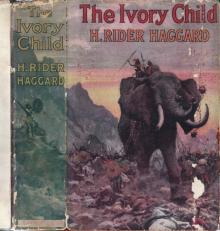 The Ivory Child
The Ivory Child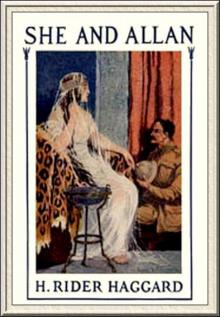 She and Allan
She and Allan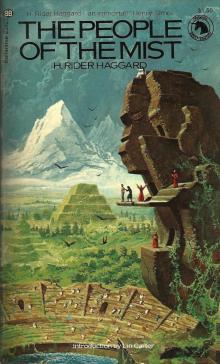 The People of the Mist
The People of the Mist She
She Morning Star
Morning Star King Solomon's Mines
King Solomon's Mines She: A History of Adventure
She: A History of Adventure Cleopatra
Cleopatra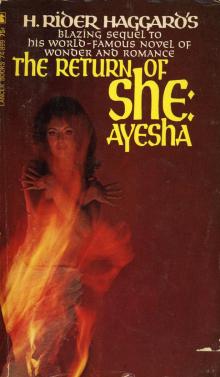 Ayesha, the Return of She
Ayesha, the Return of She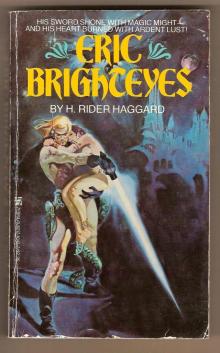 Eric Brighteyes
Eric Brighteyes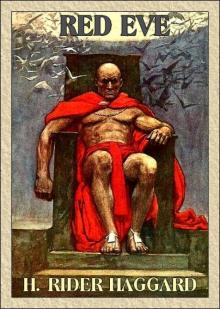 Red Eve
Red Eve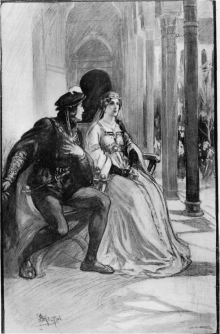 Fair Margaret
Fair Margaret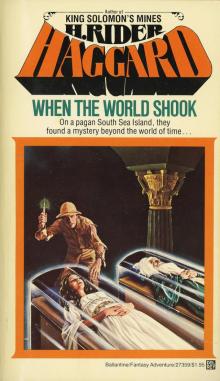 When the World Shook
When the World Shook Lysbeth, a Tale of the Dutch
Lysbeth, a Tale of the Dutch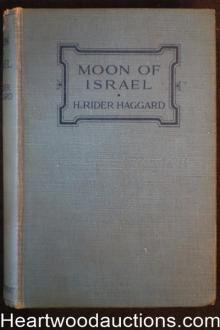 Moon of Israel: A Tale of the Exodus
Moon of Israel: A Tale of the Exodus Long Odds
Long Odds The Ghost Kings
The Ghost Kings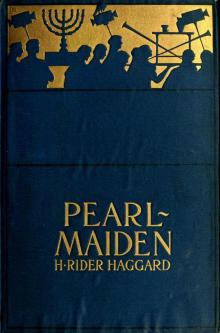 Pearl-Maiden: A Tale of the Fall of Jerusalem
Pearl-Maiden: A Tale of the Fall of Jerusalem Allan and the Holy Flower
Allan and the Holy Flower Smith and the Pharaohs, and other Tales
Smith and the Pharaohs, and other Tales The Wanderer's Necklace
The Wanderer's Necklace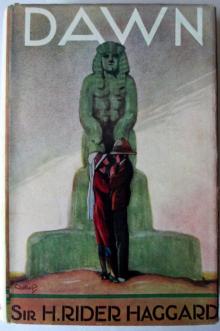 Dawn
Dawn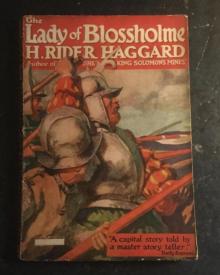 The Lady of Blossholme
The Lady of Blossholme Stella Fregelius: A Tale of Three Destinies
Stella Fregelius: A Tale of Three Destinies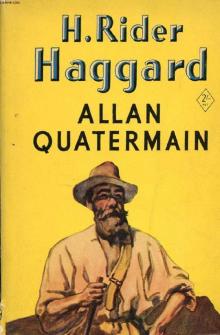 Allan Quatermain
Allan Quatermain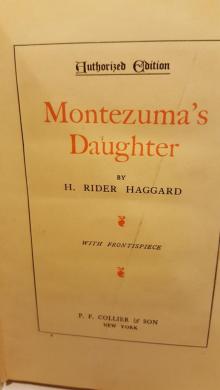 Montezuma's Daughter
Montezuma's Daughter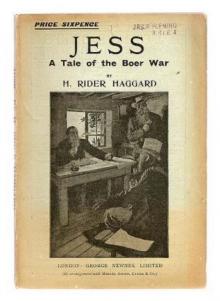 Jess
Jess The Brethren
The Brethren Allan's Wife
Allan's Wife Child of Storm
Child of Storm Queen Sheba's Ring
Queen Sheba's Ring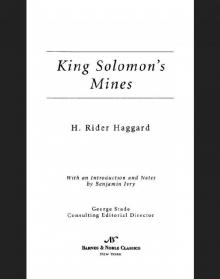 King Solomon's Mines (Barnes & Noble Classics Series)
King Solomon's Mines (Barnes & Noble Classics Series)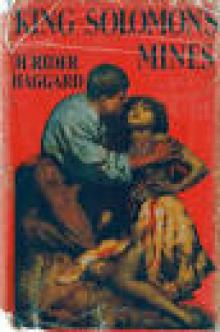 Complete Allan Quatermain Omnibus - Volumes 1 - 10
Complete Allan Quatermain Omnibus - Volumes 1 - 10